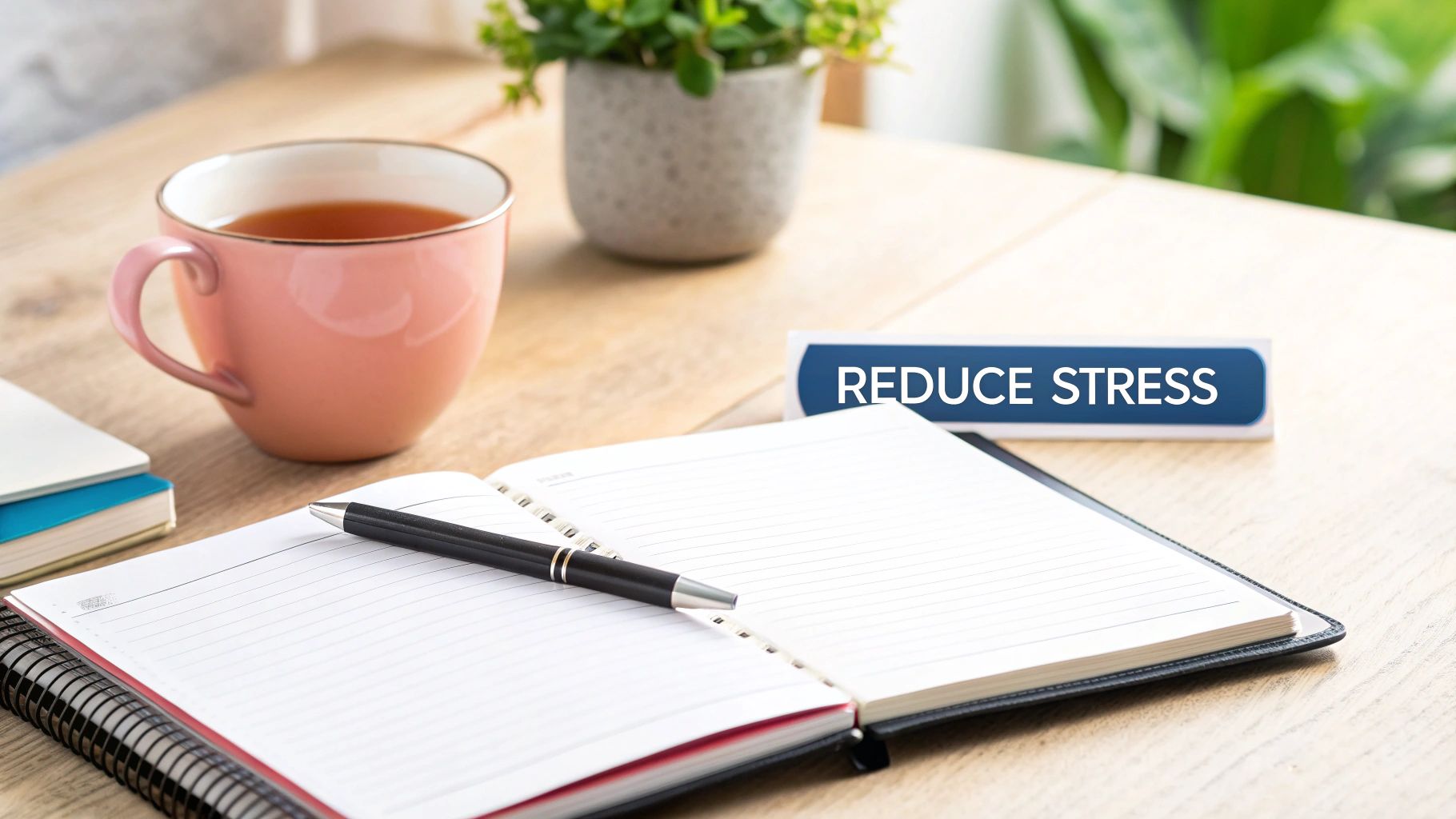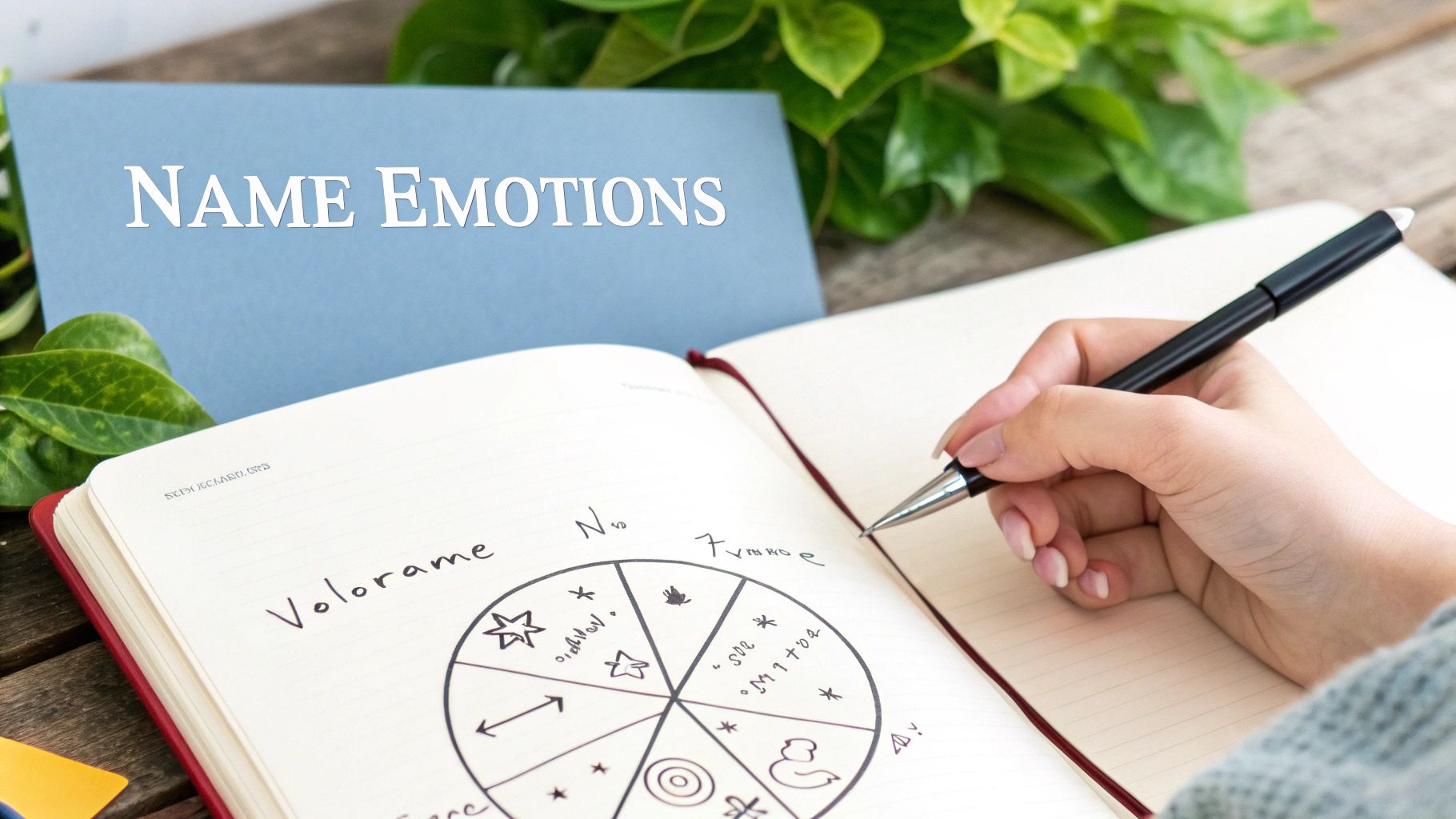Feeling overwhelmed by the constant hum of modern life? You're not alone in the search for clarity and calm. What if the most powerful tool for your well-being isn't a new app, but a simple notebook and a pen? Journaling is far more than just recording daily events; it's a scientifically-backed practice that actively reshapes your mental landscape. It's your private sanctuary to untangle complex thoughts, process difficult emotions, and connect with your truest self without judgment.
Understanding this practice is the first step toward transformation. To truly embrace this practice, it's beneficial to first understand what journaling is and its many benefits for overall well-being. This guide moves beyond the "what" and dives deep into the "how" and "why," exploring the profound benefits of journaling for mental health. We'll unpack each advantage with research-supported insights and practical action points to help you start your journey today. Prepare to discover the incredible power you hold within your own hands and words, turning a blank page into a roadmap for a more peaceful, centered life. Let's begin.
1. Stress Reduction and Cortisol Management
One of the most immediate and profound benefits of journaling is its power to dissolve stress. When you feel overwhelmed, your mind often races, replaying worries in a relentless loop. Journaling acts as a pressure-release valve, allowing you to pour these anxieties from your mind onto the page. This simple act interrupts the cycle of rumination, creating an instant sense of relief.

The impact is physiological. Groundbreaking research by Dr. James Pennebaker on expressive writing shows that this practice can lower cortisol, the body's primary stress hormone. By writing about your stressors, you activate the parasympathetic nervous system, guiding your body from "fight or flight" to a state of "rest and digest." This promotes calm, slows your heart rate, and empowers you to regulate your emotions.
Practical Action Points
- Schedule a Daily Release: Dedicate 15 minutes each day—in the morning to start fresh, or at night to unload the day's burdens.
- Write Freely & Fearlessly: Forget grammar and spelling. This is your space for raw honesty. Let your thoughts flow without judgment.
- Focus on Feelings: Don't just list events. Explore how they made you feel. Ask, "What emotion is hiding beneath this stress?" and give it a voice.
2. Enhanced Emotional Awareness and Regulation
Journaling is your personal training ground for emotional intelligence. It encourages you to pause, identify what you're feeling, and give it a name. This powerful act forges a connection between your raw emotional experiences and your conscious mind, turning confusing feelings into understandable information you can act on.

This process is central to emotional intelligence, a concept popularized by psychologist Dr. Daniel Goleman. By regularly documenting your emotional landscape, you train your brain to become a better observer of its own internal state. This heightened self-awareness is the foundation of emotional regulation, allowing you to shift from reactive outbursts to thoughtful, measured responses when faced with challenges. You gain the power to choose your response instead of being controlled by your feelings.
Practical Action Points
- Use an Emotion Wheel: When you feel a strong emotion but can't name it, consult an emotion wheel to find a more precise word than just "sad" or "angry."
- Identify Your Triggers: After describing a feeling, ask yourself: "What happened right before I started feeling this way?" Connecting emotions to events is key to gaining control.
- Rate the Intensity: On a scale of 1-10, note how strong the emotion feels. Tracking this over time can reveal powerful patterns in your life.
3. Improved Mental Clarity and Problem-Solving
Journaling is the ultimate antidote to mental clutter. It transforms chaotic thoughts into structured, actionable insights. The process of writing forces your brain to organize jumbled ideas into a linear sequence, engaging different cognitive pathways than thinking alone. This shift from abstract worry to concrete language is one of the most effective benefits of journaling for mental health, helping you untangle complex problems and see challenges from new, more manageable perspectives.

This method of externalizing thoughts is championed by productivity experts like David Allen, author of Getting Things Done. By getting everything out of your head and onto paper, you free up immense mental bandwidth. This allows your mind to move from being overwhelmed by a problem to actively analyzing it, identifying patterns, and generating creative solutions that were previously hidden by mental noise.
Practical Action Points
- Perform a 'Brain Dump': Start by writing down every single thought, worry, and idea related to your problem without any filter. Clear the mental slate for focused thinking.
- Create a Decision Matrix: For complex choices, draw a simple grid in your journal to compare options against important criteria, revealing the most logical solution.
- Explore New Perspectives: Write about the problem from the viewpoint of a mentor, a competitor, or even your future self. This can unlock surprisingly innovative solutions. If you need more guidance, you can explore how to start journaling with different techniques.
4. Processing Trauma and Complex Emotions
Journaling offers a safe, private container to confront and process traumatic memories and deeply complex emotions. For experiences too difficult to speak aloud, writing provides a structured path toward healing. It allows you to explore painful events at your own pace, gradually reducing their psychological power and integrating them into your life story in a manageable way.

This approach is supported by the work of trauma experts like Dr. Bessel van der Kolk, author of The Body Keeps the Score. Expressive writing helps externalize deeply held feelings, creating distance and perspective. This methodical processing can help you reframe painful narratives, reduce PTSD symptoms, and empower you to move forward. While journaling is a profound tool, creative outlets can also help. Explore the benefits of art therapy for mental health for complementary practices.
Practical Action Points
- Set a Time Limit: When writing about trauma, limit your sessions to 15-20 minutes to avoid feeling overwhelmed.
- Follow Up with Grounding: After a difficult writing session, engage in a grounding exercise like deep breathing, a short walk, or listening to calming music.
- Use Guided Prompts: If you feel stuck, use prompts specifically designed for trauma processing to provide structure and focus.
- Work with a Professional: For serious trauma, it's crucial to use journaling as a complementary tool alongside the guidance of a qualified therapist.
5. Increased Self-Esteem and Self-Compassion
Journaling is a powerful tool for rebuilding your relationship with yourself. It provides a private, non-judgmental space to actively counter the harsh inner critic that undermines your mental well-being. By documenting your thoughts, efforts, and small wins, you create a tangible record of your strengths and resilience—one of the most affirming benefits of journaling for mental health.
This practice aligns with the work of researchers like Dr. Kristin Neff, a pioneer in self-compassion research. She has shown that self-compassion involves treating yourself with the same kindness you'd offer a friend. Journaling allows you to actively practice this mindset. Writing down your struggles and then responding with words of understanding rewires neural pathways, gradually building a more positive and stable self-image.
Practical Action Points
- Create a 'Wins' Log: Dedicate a section of your journal to list your accomplishments, no matter how small. Celebrate your effort, not just the outcome.
- Write Letters to Yourself: When you feel down, write a letter to yourself from the perspective of a loving, supportive friend. Offer yourself that same grace.
- Record Positive Feedback: Make a conscious effort to write down compliments and positive remarks you receive from others. Re-read this list when you're feeling low on confidence.
6. Better Sleep Quality and Reduced Insomnia
One of the most life-changing benefits of journaling is its ability to foster deeper, more restorative sleep. For many, the time before sleep is filled with racing thoughts and worries about tomorrow. Journaling serves as a cognitive off-ramp, allowing you to transfer these anxieties from your mind to the page, effectively clearing your mental slate for rest.

This practice directly combats the mental arousal that causes insomnia. Sleep specialists like Dr. Michael Breus often recommend a "worry journal" to externalize concerns, which reduces cognitive load and calms the nervous system. By processing your day, you signal to your brain that it is safe to power down. This ritual creates a buffer between daily stimulation and the quiet required for sleep, leading to faster sleep onset.
Practical Action Points
- Create a Bedtime Ritual: Dedicate 10-15 minutes to journaling about 30-60 minutes before you intend to sleep. This creates a consistent, relaxing habit.
- Keep It Accessible: Place your journal on your nightstand as a visual cue to make the practice effortless.
- Focus on Constructive Offloading: Use simple prompts like, "What I need to let go of from today," or "Three things I'm grateful for right now."
- Go Screen-Free After: After you close your journal, resist the urge to pick up your phone. Let your mind transition peacefully into a pre-sleep state.
7. Anxiety Management and Worry Reduction
Journaling is your secret weapon for managing anxiety. It provides a tangible outlet for the swirling, abstract worries that fuel it. The act of writing down your fears captures them in a concrete form, transforming overwhelming internal noise into manageable data. This process allows you to interrupt the cycle of unproductive rumination and begin to see your anxieties with empowering clarity.
This technique is a cornerstone of Cognitive Behavioral Therapy (CBT), as it helps you confront anxieties in a controlled environment. By externalizing worries, you can analyze them with more objectivity, identify cognitive distortions (like catastrophizing), and challenge their validity. This methodical approach reduces the emotional charge of anxious thoughts, giving you a greater sense of control.
Practical Action Points
- Schedule "Worry Time": Designate a 15-minute period each day to journal about your anxieties. If worries pop up outside this time, gently tell yourself you'll address them during your scheduled session.
- Create a "Worry vs. Plan" List: Divide a page into two columns. In the first, write your worry. In the second, brainstorm one small, actionable step you can take. This shifts your mindset from passive worrying to active problem-solving.
- Practice Acceptance Writing: For worries you cannot control, write them down and follow with a statement of acceptance, such as, "I acknowledge this fear, and I am choosing to let go of the need to control it."
Your Next Chapter: Write Your Way to a Healthier Mind
The journey through the many benefits of journaling for mental health reveals a powerful, accessible, and deeply personal tool for transformation. We've explored how the simple act of putting pen to paper can fundamentally alter our internal landscape, moving us from chaos to clarity and from distress to understanding. It's more than just a diary; it's a private sanctuary for your thoughts.
This practice is your personal laboratory for self-discovery. As we've seen, journaling offers a structured way to confront and manage stress by lowering cortisol levels, providing a tangible physiological benefit. It acts as a mirror, reflecting our emotional patterns and helping us develop the crucial skill of emotional regulation, a cornerstone of mental resilience.
From Insight to Action: Your Journaling Blueprint
The true power of this practice lies not in passively knowing its advantages, but in actively applying them. The insights gained from exploring these ten benefits are your blueprint for building a more intentional and healthier life.
- For Mental Clarity: When faced with a complex problem, use your journal as a strategic thinking partner. Map out your thoughts, challenge assumptions, and uncover solutions that were previously hidden in the mental clutter.
- For Emotional Healing: When processing difficult emotions or past trauma, your journal becomes a safe container. It allows you to externalize painful feelings without judgment, creating the distance needed for healing and perspective.
- For Self-Growth: By tracking your thoughts and moods, you cultivate profound self-awareness. This practice empowers you to build self-compassion, challenge negative self-talk, and intentionally foster a more positive and robust self-image.
Embracing the Practice: The First Step is the Only Hard Part
Getting started is often the biggest hurdle, but it doesn't require a grand plan or eloquent prose. The most transformative journaling habit begins with a single, simple commitment: one sentence, one thought, one feeling. Your entry doesn't need to be perfect; it just needs to be yours. The consistency of this small act is what compounds into significant, lasting change.
You are the author of your own story, and your journal is the first draft of your next chapter. It's a space to celebrate your wins, navigate your challenges, and consciously design the life you want to lead. The profound benefits of journaling for mental health are not just theoretical concepts; they are tangible rewards waiting for you on the other side of a blank page. Embrace this opportunity to connect with yourself, unlock your inner wisdom, and actively write your way toward a brighter, healthier mind. The journey begins today.
Ready to start your journey? A beautiful, inspiring journal can make all the difference. Discover the thoughtfully designed journals and pens at Mesmos, created to make your daily writing practice a moment of joy and intention. Find your perfect companion for mental wellness at Mesmos.
